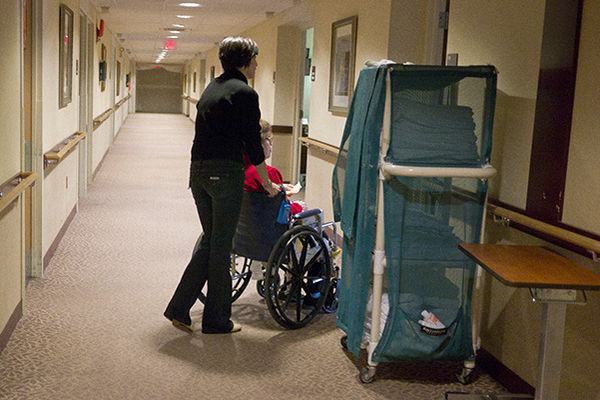Health care providers in every setting must understand that older people experience specific health issues, from multiple chronic conditions to changes in physiology, that require a specific approach to care. Risk factors for complications following medical procedures are often higher and different for older adults.
A friend of a dear colleague of mine drove this point home recently with a letter she wrote to a hospital where her 81-year-old aunt underwent a surgical procedure. Unfortunately, the care her aunt received illustrates the gaps in quality care that too many older people encounter.
We at The John A. Hartford Foundation are working hard to create health systems that are age-friendly. As part of that effort, we have exciting initiatives underway to improve both surgical care of older adults and geriatric emergency department care. As those projects continue to build momentum, we should see fewer examples of what you will find in the shortened version of my colleague’s letter below:
Editor’s Note: The names of the hospital and employees mentioned in the letter have been removed.
-----------------------------------------------------------------------------------------------------------------
October 28, 2016
Dear [NAME OF CEO],
We are writing to thank your staff for caring for my 81-year-old aunt recently after a surgical procedure at [Hospital]. I think when reviewing her chart, you will see some missed opportunities to revise some of your care delivery processes in caring for the elderly.
My aunt developed a post-surgical bacteremia after having a urological procedure on Oct. 14, 2016. She was sent home the following day with a Foley catheter still in place and an appointment for follow up with the surgeon the following Monday. On Sunday, she began not feeling well and I returned to [Hospital] Emergency Department to have her evaluated. During that visit, where we waited nearly 4 hours before being seen, she was evaluated and sent home. On Monday, about 24 hours later, I received an urgent call from the Emergency Department physician [Name] telling me that the last set of blood cultures had returned from the lab and we needed to return to [Hospital] as soon as possible given the severity of the infection. I took my aunt back for 2nd trip to the hospital, where, much to my surprise, we had to wait another 5 hours in the ED to be seen.….
Please take the time to pull her chart and read the details of her unfortunate stay thereafter. Also, note the extended time periods for each of these episodes during which I, personally, spent over 36 hours managing, losing time caring for my elderly Mother who has Acute Myeloid Leukemia and at the expense of my full-time job. Thankfully, my aunt is now recovering at [Name of Rehab Facility].
We have several questions on which we would like clarity:
1. While I understand infections are a risk factor in any surgery, and more so in urologic surgery, it seems it would have been prudent to keep my aunt in the hospital through the weekend to ensure no post-surgical infections were brewing.
2. Why did the attending physician overseeing my aunt’s overnight stay after surgery not see fit to keep her until she could urinate on her own but sent her home with a catheter and no medical assistance? Wouldn’t an elderly person with CHF [Congestive Heart Failure] and other health issues after such an operation warrant more care and observation than, say, a 55-year-old undergoing the same operation?
3. Why were we not informed there were labs pending after the 1st ER visit on Oct. 16 and to possibly expect a call to return in 24 hours? Surely protocols exist for this notification?….
4. And finally, why did my aunt have to wait nearly 5 hours for blood infection treatment during the 2nd ER visit after we were alerted to the positive cultures? Shouldn’t the ED physician who called about the positive cultures have been prepared to start IV ABX immediately upon our return to the ER? Instead, we were told we would have to wait our turn in the ER like everyone else.
We are bringing this sequence of events in lapses of care to your attention to create awareness that a person deserves respect and quality care regardless of their age. To the extent possible, we want to create awareness in your care of future elderly patients to prevent another family and their elder from the unnecessarily stressful events that we recently experienced.
We would be most appreciative of your response to all the events noted in her chart and described above. …
Sincerely,
[Name of the Patient’s Niece and Caregiver]
-----------------------------------------------------------------------------------------------------------------
Although many hospitals deliver excellent care to people of all ages, this story represents a scenario that is, regrettably, far too common. It is the reason why we at The John A. Hartford Foundation are so passionate about our newly launched Age-Friendly Health Systems Initiative, our Coalition for Quality in Geriatric Surgery project, and a host of other grant programs that are helping hospitals and health systems deliver care that meets the unique needs of older adults and their families.
An age-friendly health system would focus on the elevated risks of older people after surgery, would ensure that the older patient and her family caregiver are truly prepared for discharge from the hospital, and would have processes in place to minimize the burden of multiple visits and excessive, and potentially harmful, delays in care.
I am so glad that my colleague’s aunt is recovering. And, thankfully, she has an advocate in her niece, who is pushing their local hospital to review the care delivery processes that allowed such egregious lapses in care to occur.
Just as my colleague’s aunt and her niece are doing, we too can become advocates in our own health care systems to help make them age-friendly. Together, we can build a movement to highlight the specific care needs of older adults and help improve care for all of our older loved ones.

